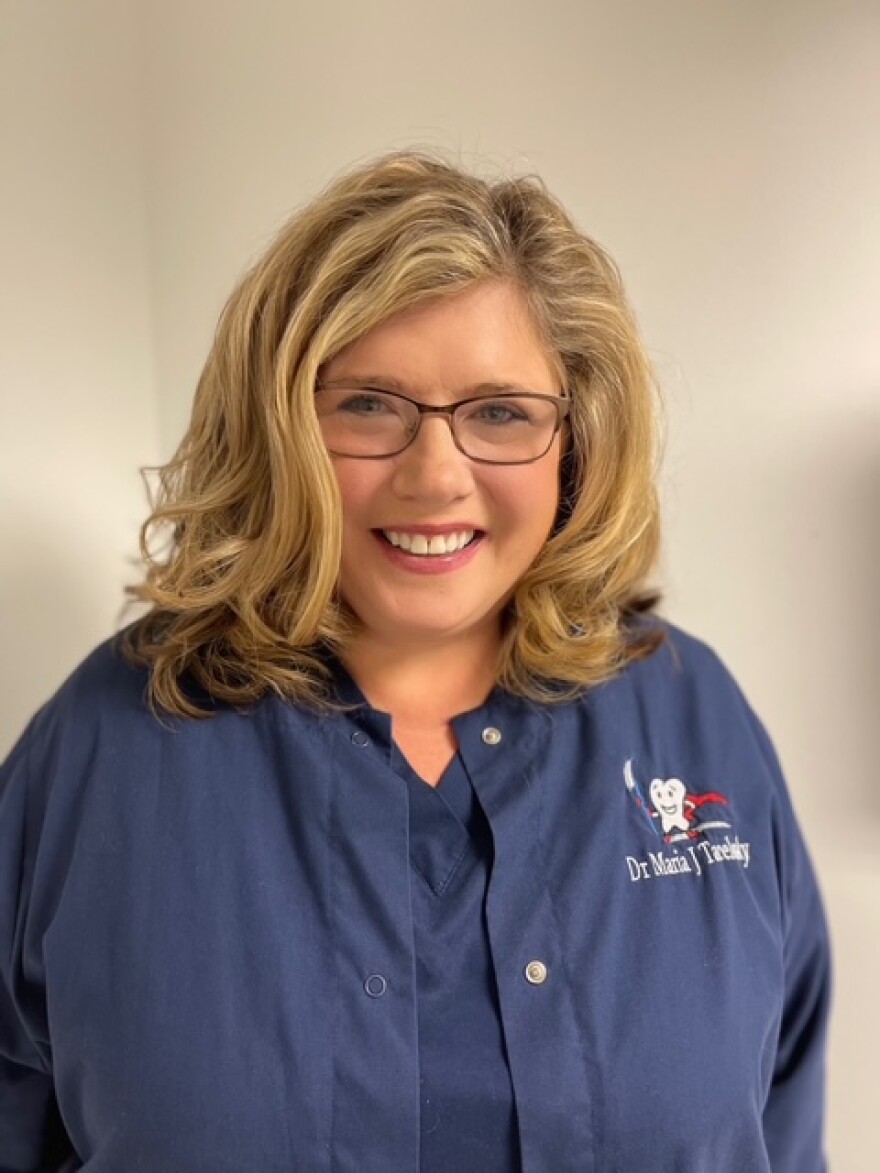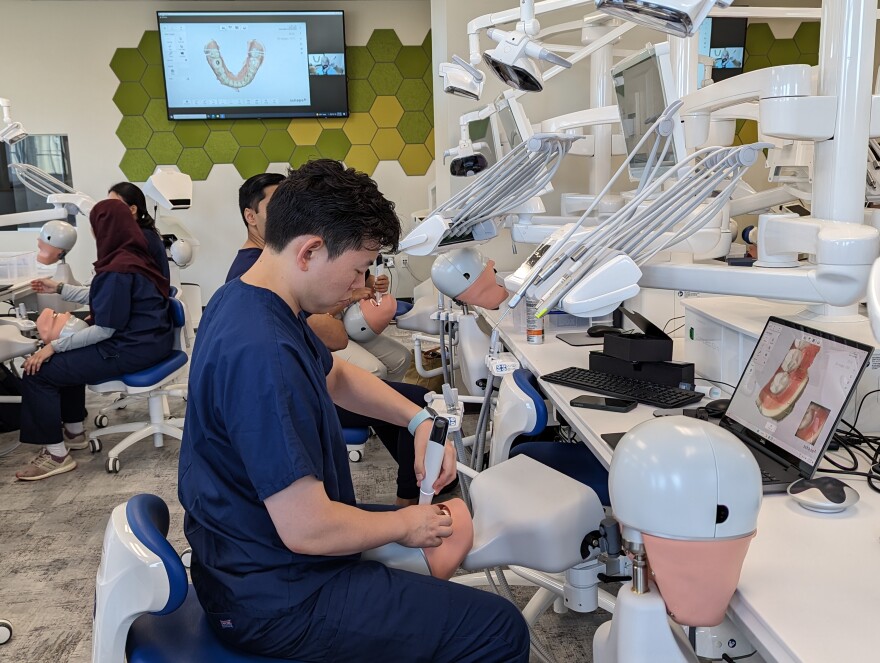Robert and Amy Craig’s son Daniel needs six root canals.
As an adult with a disability, the 22-year-old is covered by both his mother’s private dental insurance and AmeriHealth, a Medicaid plan.
The family goes to Bright Smiles Dental Art in Tamaqua, about a 15 minute drive from their home in Carbon County. But private insurance won’t cover the full cost of the root canals. And Bright Smiles Dental Art does not take Medicaid.
Now, the Craigs are tasked with finding somewhere that will accept their son’s insurance.
“In order to find a specialist that would take both insurances, we're looking at about an hour-and-a-half of travel one way,” his father said.
The parents work full time and have two other children besides Daniel. They’re frustrated with the lack of accessible dental care.
“It is a full-time job to find your child care, and that shouldn't be. We are working parents with insurance,” his mother said. “It's all about us Googling, who can get us in, calling, who can get us in.”
Soon, Medicaid patients like Daniel Craig won’t have to go far for their routine checkups or root canals without out-of-pocket costs.

Temple University’s Kornberg School of Dentistry announced this summer that it will start a rural dentistry track. The program will be piloted in Tamaqua and will open as soon as 2026.
Temple said the program is the first of its kind in the state. Students will spend their first two years of dental school at Temple’s main Philadelphia campus and the last two years in Tamaqua. Temple will pay for students’ housing in downtown Tamaqua, which will be within walking distance of the dental facility.
“I think the benefit is providing care to people and sustaining that operation," said Dr. Amid Ismail, the dental school’s dean.
Temple dental coming to Tamaqua
Ismail said the cohort has room for 20 students.
The program will provide care to underserved communities while also encouraging students to practice in rural areas. Students’ clinical experience will come from serving patients from Tamaqua and surrounding areas.
“The clinic is predominantly going to be designed to take care of Medicaid patients,” he said. “The purpose of it is not to take commercial insurance or patients who pay out of pocket and ... can afford care and other locations.”
Students will offer a variety of dental services.

“It’s going to be full comprehensive care. What I mean is that everything will be provided, minus care under general anesthesia and hospitalization,” Ismail said.
State Sen. Dave Argall (R-Schuykill County) helped make the idea a reality for Temple. He recently hosted a public hearing for the Senate Majority Policy Committee, which he chairs, about what Senate Republicans called “a severe dental care crisis in rural Pennsylvania.”

“We've heard testimony time and time again that if a student trains in a rural town, they're more likely to someday practice in a rural town,” Argall said.
He’s happy to see dental care become more accessible for many of his constituents, as well as Pennsylvanians in surrounding counties.
“It's very good news, not just for us, but for all of the surrounding counties, because there will be people coming here to get free dental care, people that don't have insurance, people that maybe they're receiving some kind of government program that doesn't include dental insurance,” Argall said. “They'll be able to get free dental care at the school. I'm thinking people from Hazleton, people from Allentown, people from the surrounding counties. This isn't just a Schuylkill County thing.”
Economic opportunities for Tamaqua with Temple dental’s impending arrival
Temple does not yet have a facility for the Tamaqua campus.
The university already secured student housing. Argall said the building on downtown Tamaqua's West Broad Street is an old department store that will be renovated into apartments. Temple will cover students’ housing costs, which will be financially supported by tuition.
“It's a great incentive for them that they're not paying rent,” Ismail said. “That could be a reduction of $15,000 a year in terms of cost, and certainly living expenses in Tamaqua are significantly lower than living expenses in Philadelphia. They don't have to drive, they don't have to take a bus, so there's a lot of advantages living in Tamaqua compared to Philadelphia.”

The university is working with Tamaqua Area Community Partnership, a local nonprofit, to secure a building for the school. Temple will rent the space, whether it’s a brand new building or a renovated one, from the partnership.
“It has a financial economic development component, because we're not going to be renters for a few years,” Ismail said. “We're going to be renters for decades, if not forever. It has a job development component, and it has a very important dental care component, which is missing in rural areas.”
Micah Gursky, the community partnership’s executive director, confirmed the collaboration.
“One of the core community revitalization strategies of our Tamaqua Choose Happiness community plan is to invest in and celebrate education and learning — everything from Head Start to building trades, technical training, on-the-job training, and yes even medical education,” Gursky said. “Training dentists who value and want to be part of genuine rural communities will be a powerful and purposeful way to create opportunities. We are just beginning and look forward to recruiting from and recruiting to overlooked rural areas where dentists can have professional success and a deep and meaningful impact.”
Ismail said the school will open by the 2026 fall semester if they decide to renovate an old building. Building a facility would likely push the start until the fall of 2027.
“The sooner the better,” Argall said of the timeline.
Argall said Temple’s presence will contribute to the economic development efforts he’s been pushing for as a legislator.
“It's certainly a big shot in the arm for education. It's incredible for health care, and in terms of our continuing downtown revitalization, it's probably good news for our restaurants and our pubs as well,” he said.
The state of rural dentistry in Pennsylvania
For many rural Pennsylvanians like the Craig family, dental care is not accessible, especially if they are covered by Medicaid.
Dr. Maria Tacelosky works at Bright Smiles Dental Art. She spoke at Argall's public hearing on behalf of the Pennsylvania Dental Association as a member and former trustee, echoing the committee's concerns about a rural dental crisis.
Bright Smiles Dental Art is still accepting new patients, but she knows many other dentists in the region that are overwhelmed.
“There's a crisis going on because we don't have enough dentists in general to treat the patients that we have, let alone treat the patients that are on Medicaid,” Tacelosky said. “I find that a lot of our providers or dentists are aging out of the workforce, and they aren't being able to sell their practices, and there's no new practitioners moving in to take their place. As they're aging out of the workforce, we are getting more and more patients with fewer people to treat them.”
Dr. Laura Dimino, assistant director of the Center for Rural Pennsylvania, says the center's research bears that out.
“By our estimates, about 23% of all dentists in the state are 65 or older, so heading toward retirement. In addition, about another 23% are between ages 55 and 64 so they're getting ready,” Dimino said.
The center estimates that there are 7,300 active dentists in the state, Dimino said. The organization also estimates there are about 7,800 active dental hygienists, she said. Those numbers indicate a statewide dental professional shortage.
“The Pennsylvania Coalition for Oral Health states that we need at least twice as many statewide to provide adequate care,” she said.
And the dentist-to-resident ratio is much lower in the state’s rural counties than in its urban ones.
“In our rural counties, we have about 3.75 active dentists per 10,000 rural residents. In urban areas, that number is 6.3. We can see that disparity between rural and urban areas, and even though some urban populations also have shortages, the shortages are particularly acute in our rural counties,” Dimino said.
Dentist burnout, patients neglecting dental health in rural Pennsylvania
Tacelosky said patients having to travel for care makes them reluctant to schedule appointments.
“The mouth is the gateway to the body and so many other diseases are affected by the mouth. Diabetes, heart disease, premature births, they're just a few, and people aren't taught the value of oral health and how important their teeth are to everything that goes on in their whole body,” she said.

She knows that patients without dental insurance or with Medicaid might push off their dental issues until it’s too late. Many go to emergency rooms, where they are not likely to be treated properly. Emergency rooms are often not staffed with dentists.
“[Patients are] getting a band-aid on their problem because they can't find someone to take their tooth out or do a root canal or do whatever needs to be done,” she said.
Tacelosky also sees burnout as a rural dentist.
“It's mentally and physically overwhelming, because you want to help the people, but there's a point where you can only see so many patients in a day and treat them correctly, and give them the standard of care they deserve. It's frustrating, and it's mentally draining because you feel helpless,” she said.
Temple dental coming to Tamaqua is much needed, she said.
“Our rural counties deserve the same standard of care and the same treatment as people in urban areas, and unfortunately, because we are rural, our people aren't getting that,” she said. “I hope this clinic opens, and I would love to see the students become immersed in the community and want to open private practices or stay in these areas to treat our patients and to see how wonderful the people of Northeast Pennsylvania really are, or any rural area in the state.”
Hopes for the future of Temple’s Tamaqua program
Ismail sees a bright future for the program. The long-term plan is to open a permanent regular clinic in Tamaqua.
“It’s in the vision, but in order for us to reach that vision, we have to finish the program first, and the first step has a long way to go,” Ismail continued.
For now, he’s focused on sustainability and starting to fill the gaps in rural dentistry.
“I hope that the patients who currently have a lot of problems receiving care, will receive care without the hassles of driving long distances,” he said. “I hope that we have the political support to operate and sustain the clinic. And I hope to discuss with the local community college about training dental assistant dental hygienists who will be needed in this clinic.”
He plans to promote the program this school year.
“Before opening, hopefully this fall, we will have tour buses to take the students who are interested to see the city, to see the area, so that they could feel it instead of working by name only,” Ismail said.
Argall wants the Tamaqua program to serve as an example for the rest of the state.
“My goal is to make sure that the one in Tamaqua is a big success [so] that we can then build in other rural communities,” he said.
Tacelosky, a Schuylkill County native herself, hopes young people see a new career opportunity. She went to Pittsburgh for dental school before returning home to practice.
“People in high school will start to see, 'Hey, I'm going to college. I want to stay around here. This is a great thing, and I'll be able to come back and practice near my hometown,'” she said.
The Craig family looks forward to more accessible care for their son and for other families in similar situations.
“Bring it on. Bring it to this community. We need it. This is a service that is more than just extra, it's what you need. It's part of your health. Anyone who is willing to help our community, I'm 100% for,” Amy Craig said.














